
 |
|
|
#1 |
|
Member
Join Date: Dec 2004
Location: Witness Protection Program
Posts: 1,730
|
hello,
my first post here.. a friend of mine knew my obsession with sharp thingies, so he asked me if i could help him on a dagger he picked up recently. only problem is i have no clue regarding european daggers, so i told him i'll take some photos and ask the experts here. so here it is: 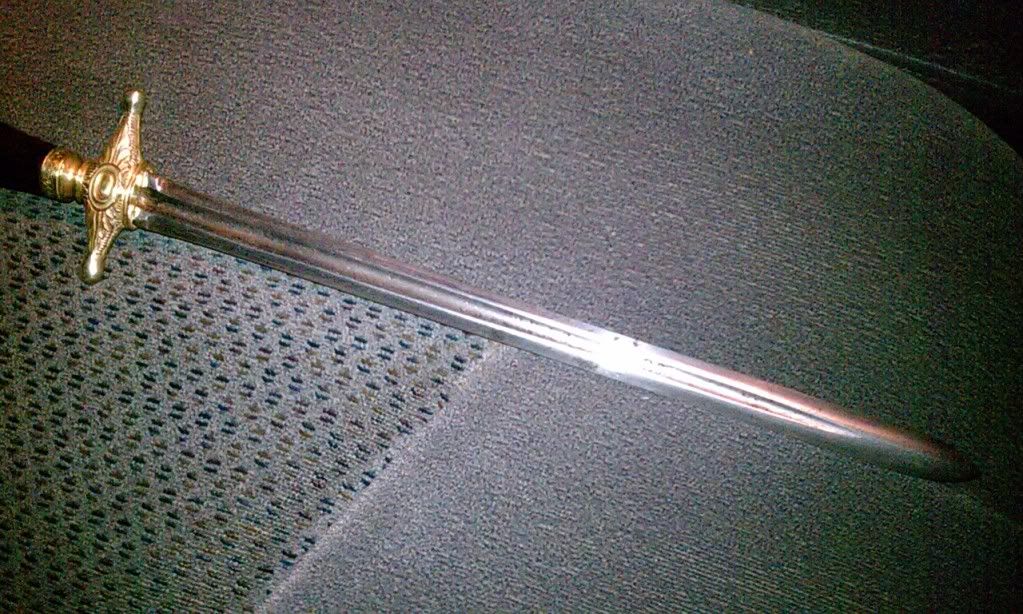 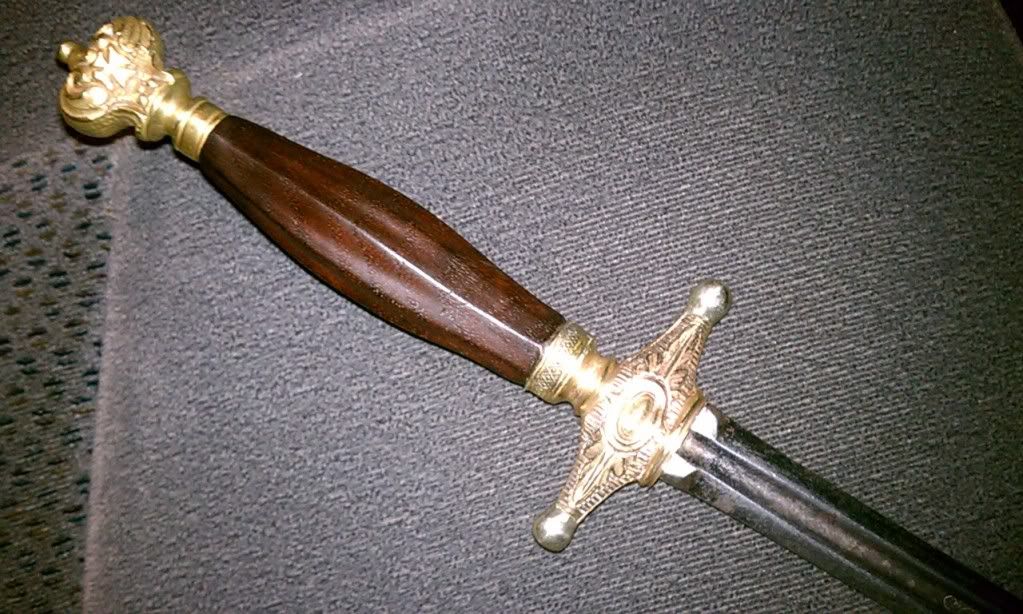 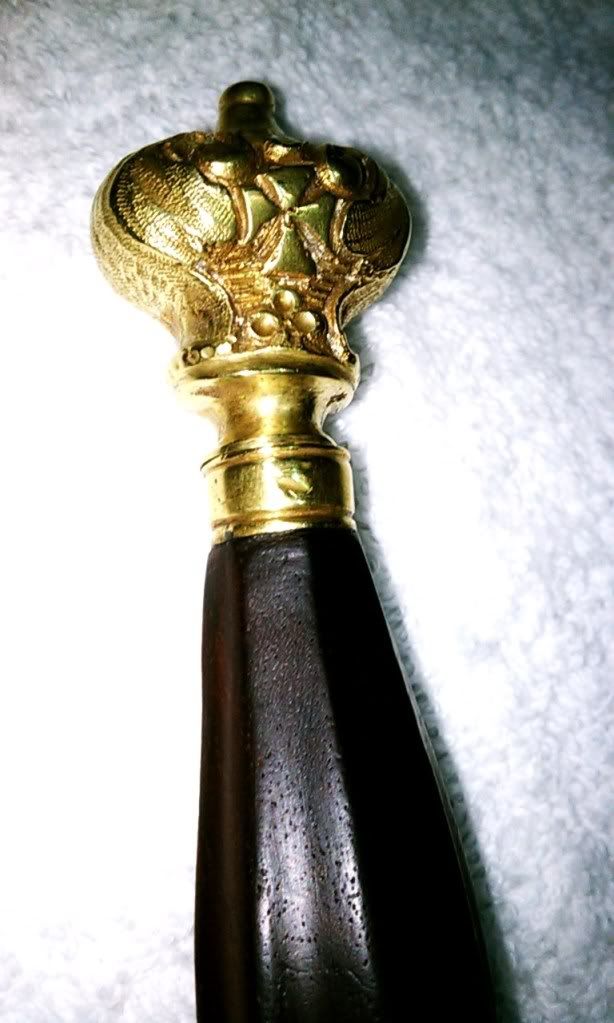 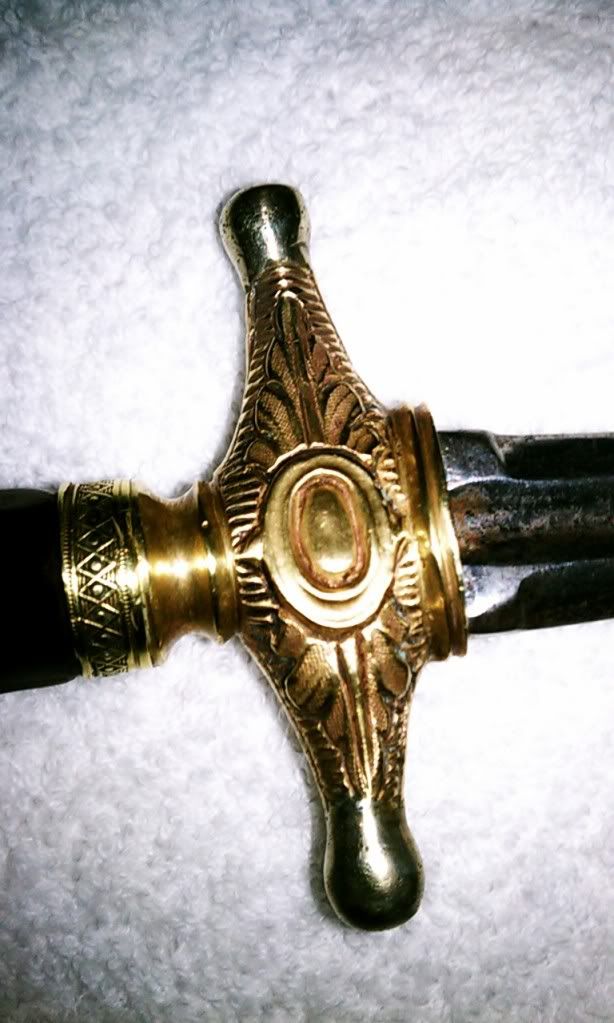 the dagger has a 10 inch blade, unsharpened edge, with a single deep fuller. in the fuller, i can make out "FRANZINI" and what looks like a maker's mark. the handle is about 6 inches long, made out of rosewood and a crossguard and pommel made out of brass |
|
|

|
|
|
#2 |
|
Member
Join Date: Dec 2004
Location: Witness Protection Program
Posts: 1,730
|
more pics:
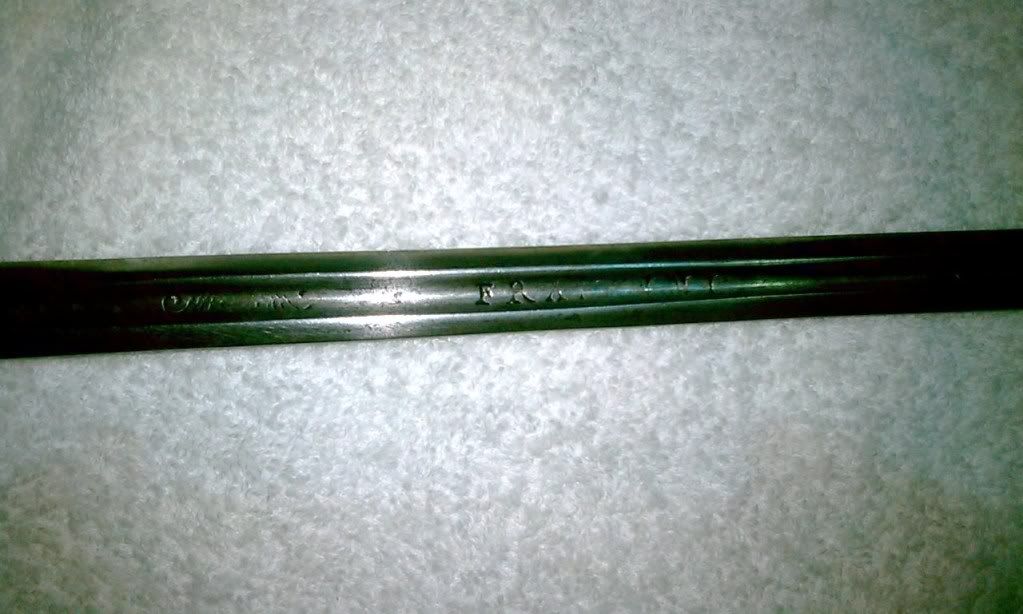 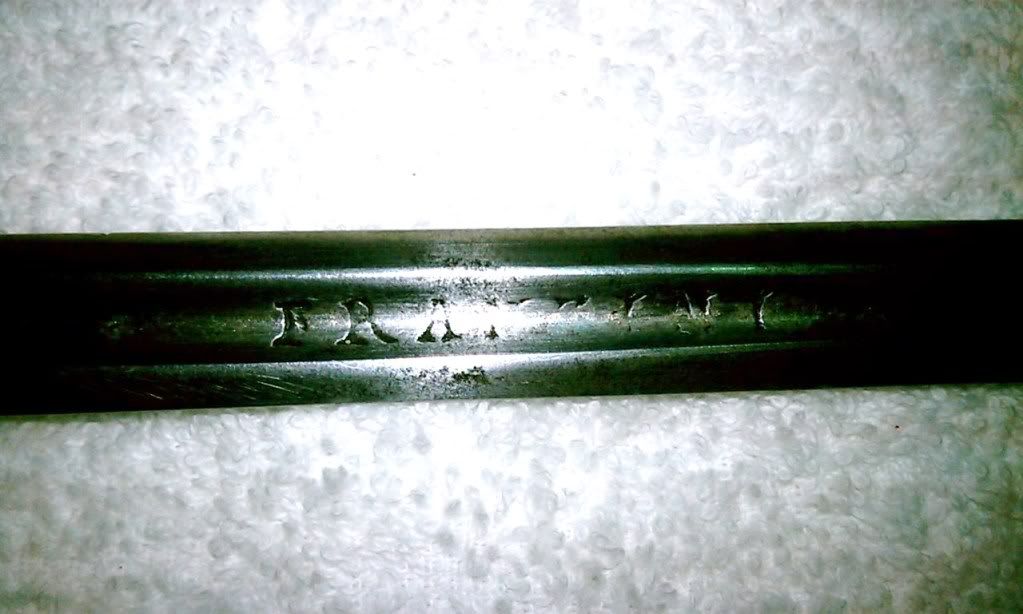 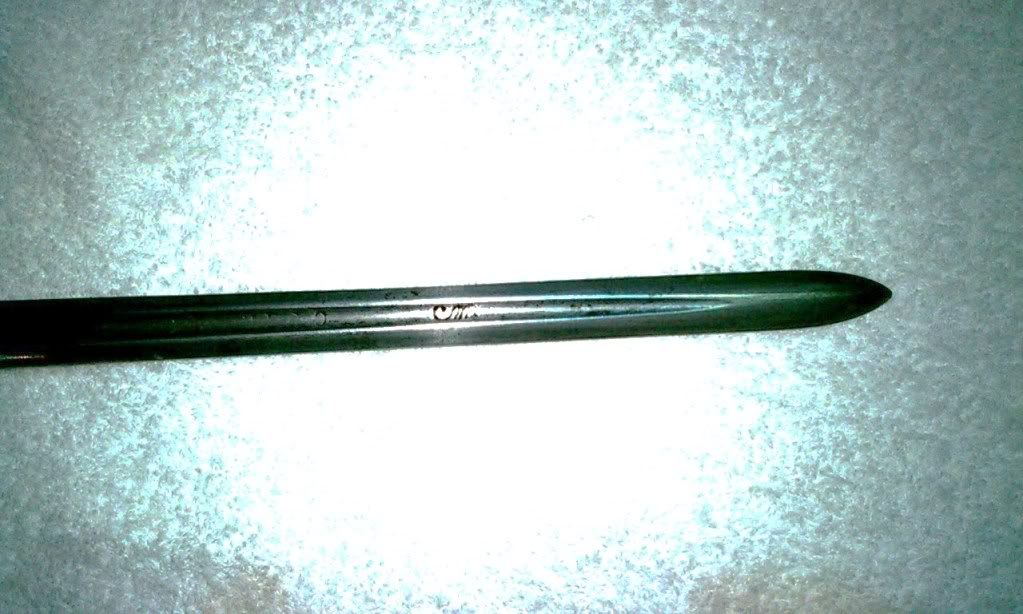 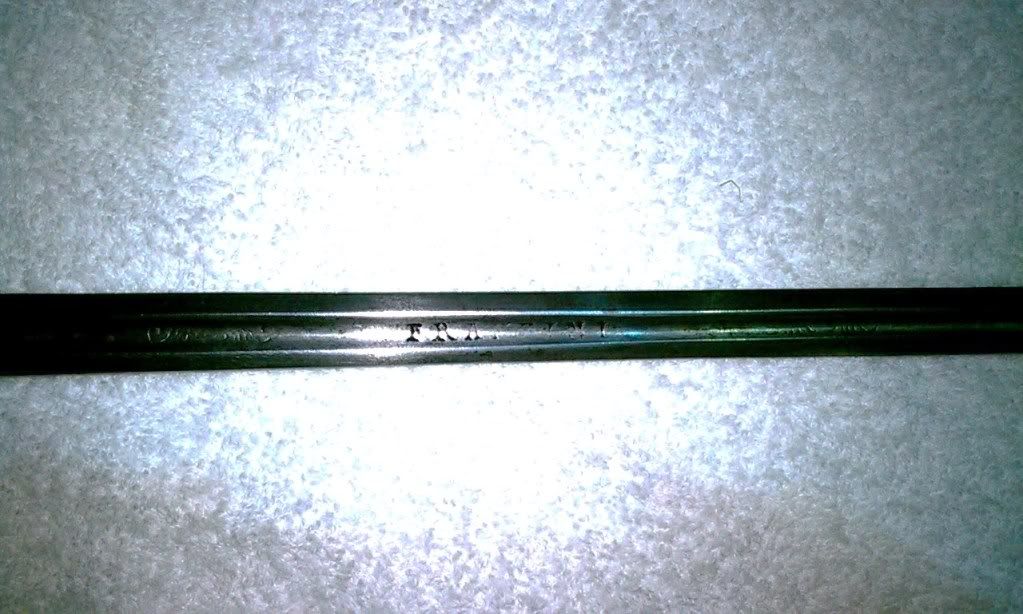 he would like to know the provenance of this dagger, and how old is it? from the way it looks, the blade looks old, perhaps1800's? thanks in advance! |
|
|

|
|
|
#3 |
|
Member
Join Date: Dec 2004
Location: Witness Protection Program
Posts: 1,730
|
Any info on this?
|
|
|

|
|
|
#4 |
|
(deceased)
Join Date: Dec 2004
Location: Portugal
Posts: 9,694
|
Hi Spunjer,
I am surprised with the silence of our experts; but they will end up coming in, i am sure. For a start, i would suggest that this blade was originaly longer, belonging to a sword, judging by the extension of the fuller almost reaching the tip of the blade, which is not normal, and also by the blade base (forte), typical to a sword hilt mount. Let's see if this humble 'diagnosis' calls for the guys with much more knowledge of these things. On the other hand, it would be nice that you post better pictures of the Franzini inscription and the maker's mark, for better appreciation of this fine loooking blade. |
|
|

|
|
|
#5 |
|
Member
Join Date: Jul 2009
Posts: 214
|
I don't know if this is a starting point or not but i've found several references in auctions to a Mediteranian musket stamped by an M. Franzini http://rockislandauction.com/viewitem/aid/50/lid/68 . The overall appearence of the dagger is 18th century to my eyes. Fernando, I was wondering if the blade may have been cut down as well.
|
|
|

|
|
|
#6 | |||
|
(deceased)
Join Date: Dec 2004
Location: Portugal
Posts: 9,694
|
Quote:
Quote:
Quote:
 . |
|||
|
|

|
|
|
#7 | |
|
Member
Join Date: Jul 2009
Posts: 214
|
Quote:
Is it possible that M.Franzini referes to a firm? Several craftsman of different types working for a mastercraftsman? Of course given the popularity of plagerizing the names of renown makers like Ferrara its quite possible that the Franzini name has been used by another maker on this example to appear to be some one elses work. |
|
|
|

|
|
|
#8 |
|
Member
Join Date: Dec 2004
Location: Witness Protection Program
Posts: 1,730
|
thank you, gentlemen! when the picture was taken, the lighting was bad. i inform the gentleman to bring it over tomorrow so i can take better pictures. too bad he did a major no-no: he polished the brass on the pommel and handguard. i'll post some better close-ups tomorrow. now, does the hilt and handguard signifies anything?
|
|
|

|
|
|
#9 | |
|
(deceased)
Join Date: Dec 2004
Location: Portugal
Posts: 9,694
|
Quote:
 ... Are you there Jim? |
|
|
|

|
|
|
#10 |
|
Arms Historian
Join Date: Dec 2004
Location: Route 66
Posts: 10,782
|
Hi Nando,,
I agree with you and Alan, this does look like a cut down rapier blade, and of the section often seen on both Spanish and Italian rapiers c. 1680s. I have always been under the impression these were being produced in Solingen for Spanish market and often used spurious names and phrases, such as 'JESUS' MARIA' I have seen on some. These same type blades are found on Italian rapiers (as noted c.1680s) and are seen in Boccia& Coelho. I believe this dagger is probably 19th century in mounts, and reflects neoclassic styling and symbolism with the acanthus leaves, trefoil (clover) and the cross pattee. It is of Italian style recalling mid 17th form (Boccia & Coelho #617-620). These central fuller blades from rapiers seem to have been widely distributed and in trade late into the 18th century. I believe the reason for this is that highly tradition gentry, especially the Spanish, remounted these blades not only in smallswords but in the long use of the earlier rapiers. I searched as well for 'FRANZINI" but really found nothing either, though the name Franchini does come up c.1490 in a maker of Italian polearm heads. Many of these names and words both Italian and Spanish were used spuriously by German makers. What Alan notes on names that occurred over long periods of time is right, often these were families which became firms and many individual workers were involved. This is the reason that accounts for such wide variation in makers marks and guild marks. Regarding Ferrara, this is very much the case, in fact it is widely doubted that Ferrara actually even refers to a single maker and is more likely a term which is applied as a 'brand' or style for a blade destined to particular market. For example, on Scottish broadswords the 'ANDREA FERRARA' was very much favored by the Scots, and the word Andrew (It. Andrea) meant loosely 'true' or 'reliable' while Ferrara obviously Lat. for iron (steel). In Solingen these markings were placed on the blades accordingly, while other terms/names were used as well, i.e. Sahagum. I am wondering if perhaps 'Franzini' may have been applied in the channel of this rapier blade which is of the trade type and perhaps in this sense, for Italian market. It is known there was an interchange between Germany/Italy and Spain in this commerce. Could we see close ups of the other markings for more clues? In the meantime I would say this is a 19th century dagger using a probably early 18th century blade in neoclassic mounts with blade cut down accordingly.My only other note would be that the blade seems to almost widen slightly reflecting an almost spatulate look, or maybe its just the perspective. Ok OK another treatise I know!!!!  All the best, JIm |
|
|

|
|
|
#11 |
|
Member
Join Date: Jul 2009
Posts: 214
|
I believe, from my short time around this forum that this is why Jim is " the man " so much of the time.
|
|
|

|
|
|
#12 |
|
Arms Historian
Join Date: Dec 2004
Location: Route 66
Posts: 10,782
|
Just found a reference (T. Del Mar sale, 332, 2007, #216) a boys swept hilt rapier, early 17th century signed Claudio Franzini. The blade was around 36" and the central fuller terminates similar to this, however the forte block is different and is not intersected by the fuller as seen on this blade of our example.
I think more support that the Franzini name was probably known and perhaps used in the Solingen blades. On the blade sold in the auction it states the name appears between decorative marks but could not see them in the photo In the fuller on the dagger posted here it seems like I see an O in the inscription. Also toward the end of the fuller what looks like a cursive M, can we find more on the full markings and names ?. |
|
|

|
|
|
#13 |
|
Member
Join Date: Dec 2004
Location: Witness Protection Program
Posts: 1,730
|
i will take pictures of details, jim. thank you!
|
|
|

|
|
|
#14 | |
|
Arms Historian
Join Date: Dec 2004
Location: Route 66
Posts: 10,782
|
Quote:
Thank you Alan, not really though, its just that I love to research, learn, and try to share what I find. Its all about the search, and the most fun is when everybody really digs in and finds answers. You'll see that often old threads pop up when something is found...its all case NEVER closed and always finding new evidence!  For example, still looking on this one. This dagger is virtually 'of the style' of Italian pugnale's of late 17th and well into the 18th as I found in the "Arms and Armour Annual" (ed. Robert Held, 1973). In an article on what are known as 'fusetti' or 'bombardier stilettos' which were thin bladed daggers with graduated scales on the blades the exact same hilt configuration is seen.Often these were carried by assassins as in those times only these military gunners were allowed these stilettos, which had been outlawed as insidious weapons earlier. The baroque motif and symbols which allude to possible secret society or fraternal association along with the acanthus leaves suggest Victorian period gentry oriented classicism. While the blade suggests it is Italian, it would seem that the attraction to things Italian in England in fashion, literature etc. would have made this particular dagger with somewhat sinister allusions even more attractive. These are my observations so far, and as always, I very much look forward to the views of others. All the best, Jim |
|
|
|

|
|
|
#15 | ||
|
Member
Join Date: Jul 2009
Posts: 214
|
Quote:
Quote:
I believe the blade has been cut down as Fernando notes about the fuller reaching nearly the tip of the blade. It also seems to teminate deep inside the quillon block as it exhibits no signs of tappering where it enters. While fullers could continue slightly inside the block generally they're tappering away, this fuller seems to be continuing in uniform width when it enters the block ( the fuller of the composite sword I posted earlier is defintely narrowing at the point where the shoulder of the original guard would have been by way of example ). |
||
|
|

|
|
|
#16 |
|
Member
Join Date: Dec 2004
Location: Witness Protection Program
Posts: 1,730
|
i think you nail it on the head, jim! what he forgot to mentioned was a bunch of obscure letters on the other side of the blade. barely legible. see here:
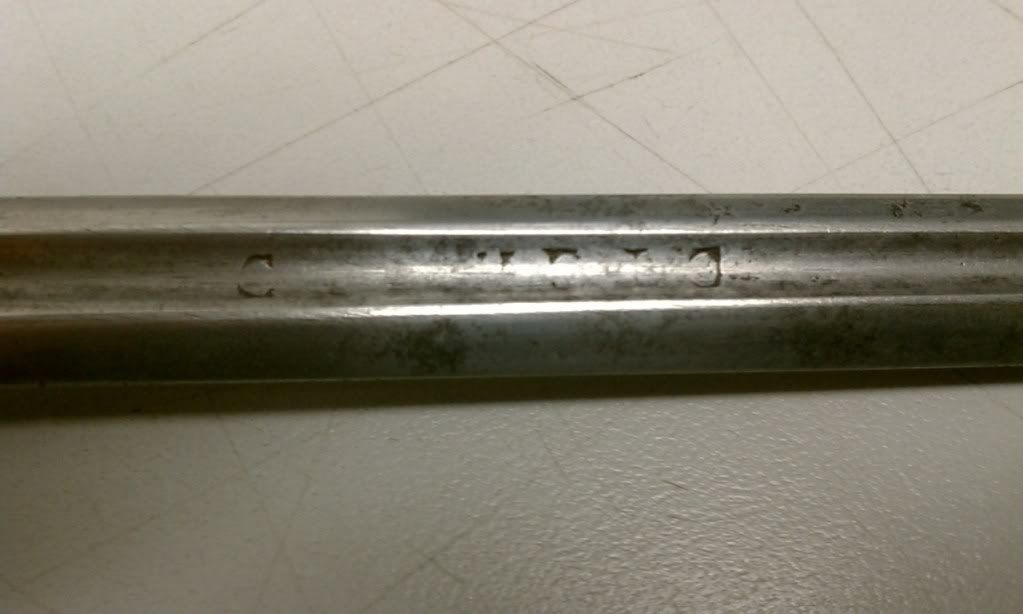 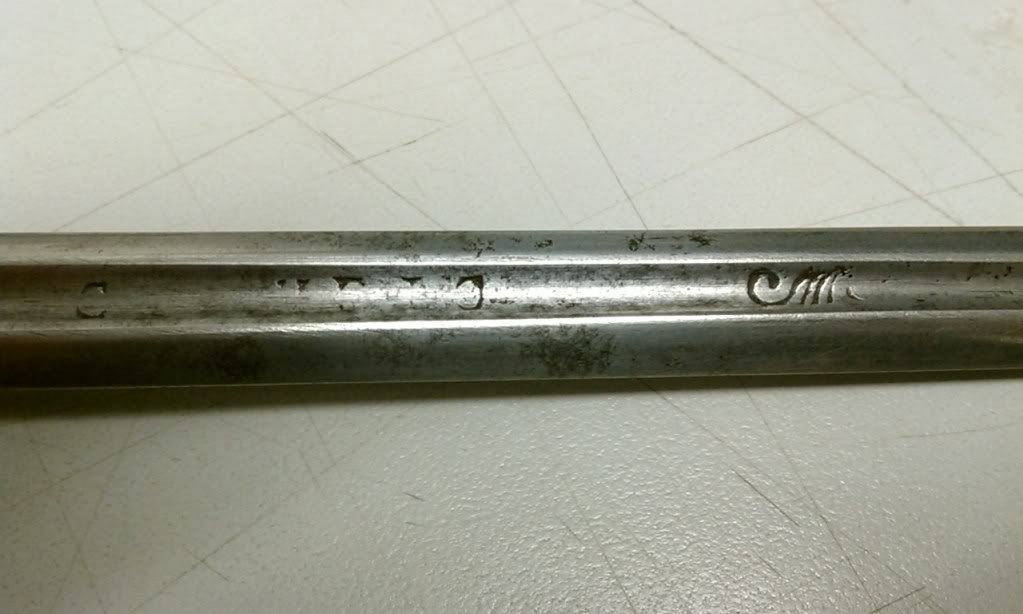 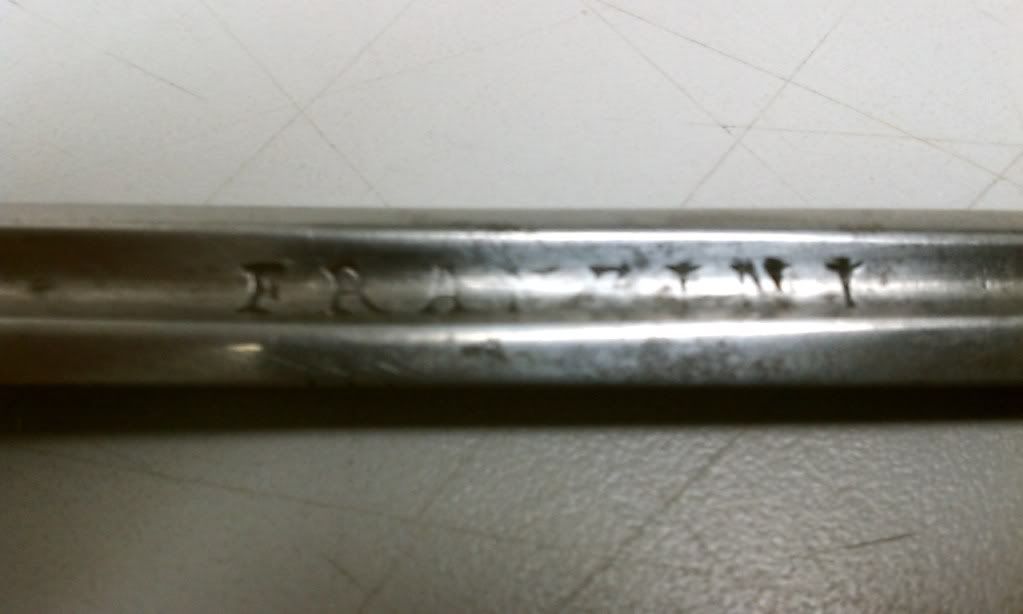 the name "CLAUDIO" matches! so it could be "CLAUDIO FRANZINI" like you mentioned and here are the maker's marks: 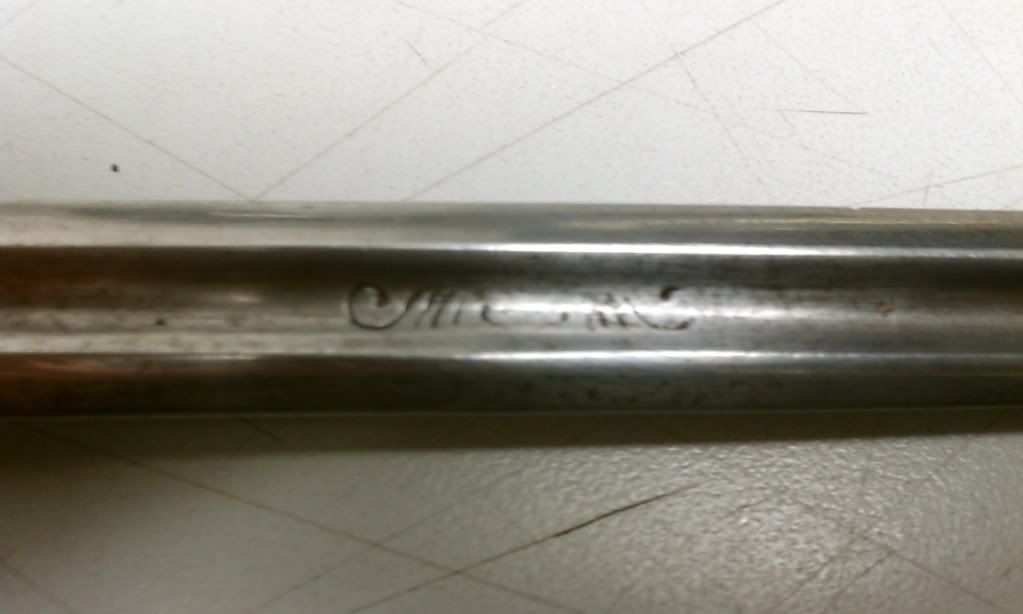 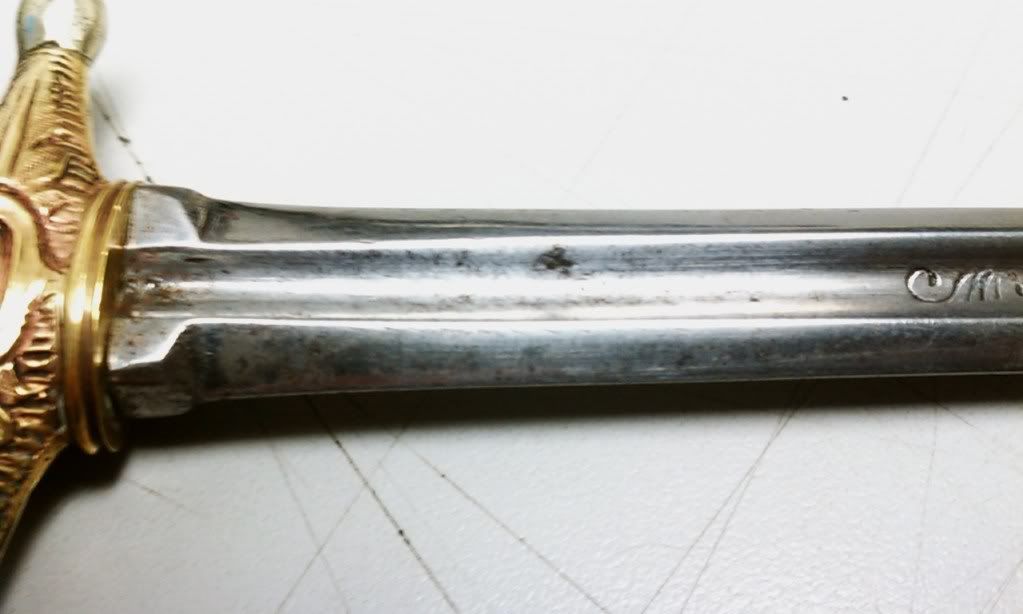 close up of the tip: 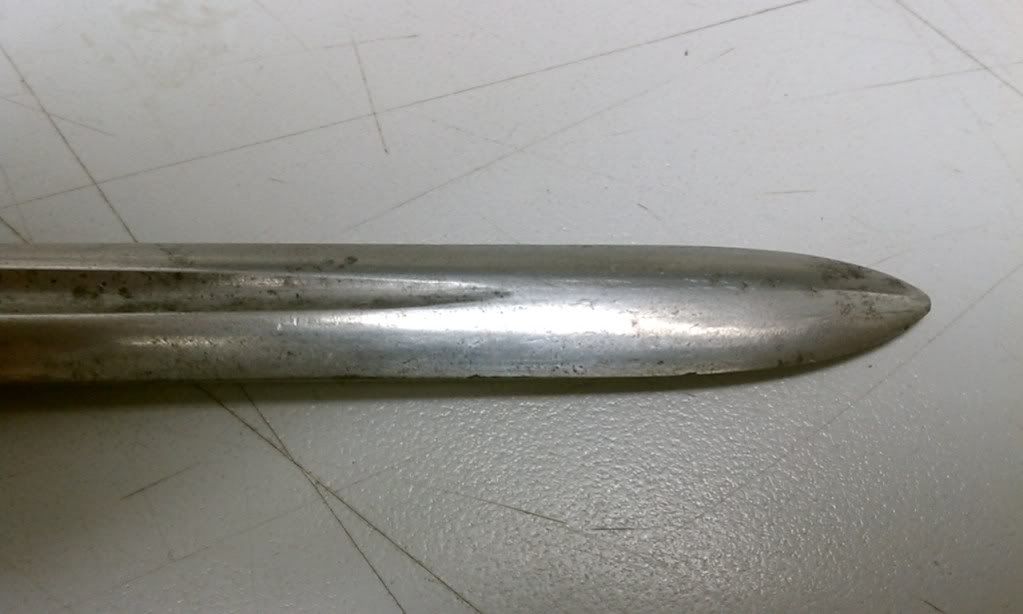
|
|
|

|
|
|
#17 |
|
Member
Join Date: Dec 2004
Location: Witness Protection Program
Posts: 1,730
|
here are the dimensions:
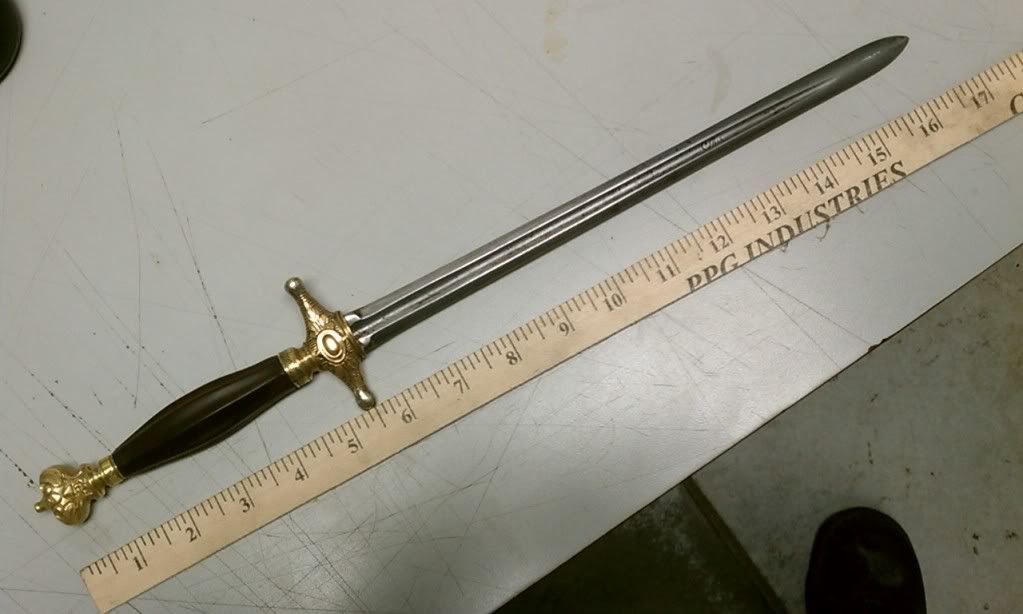 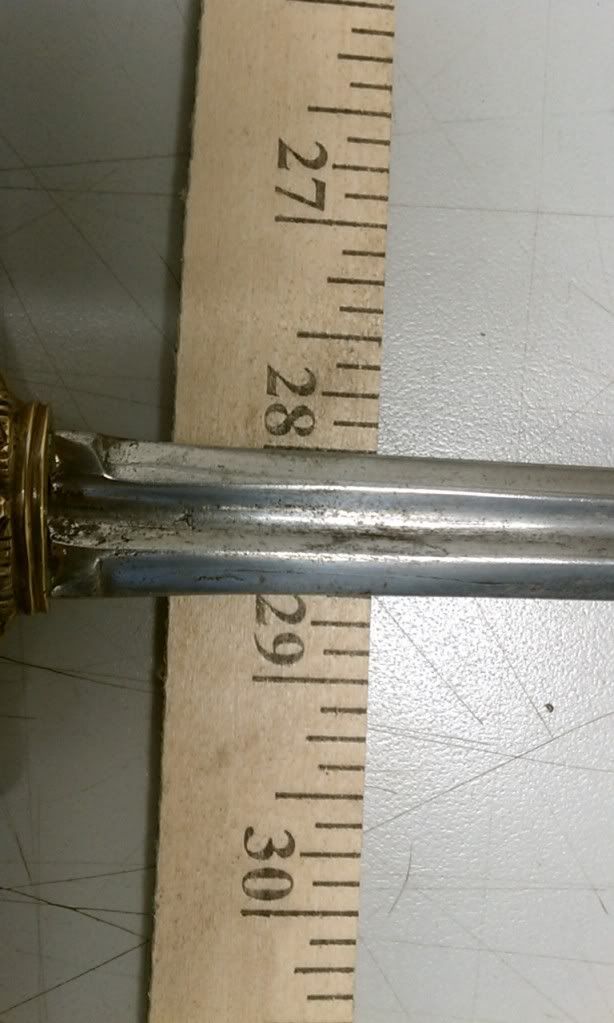 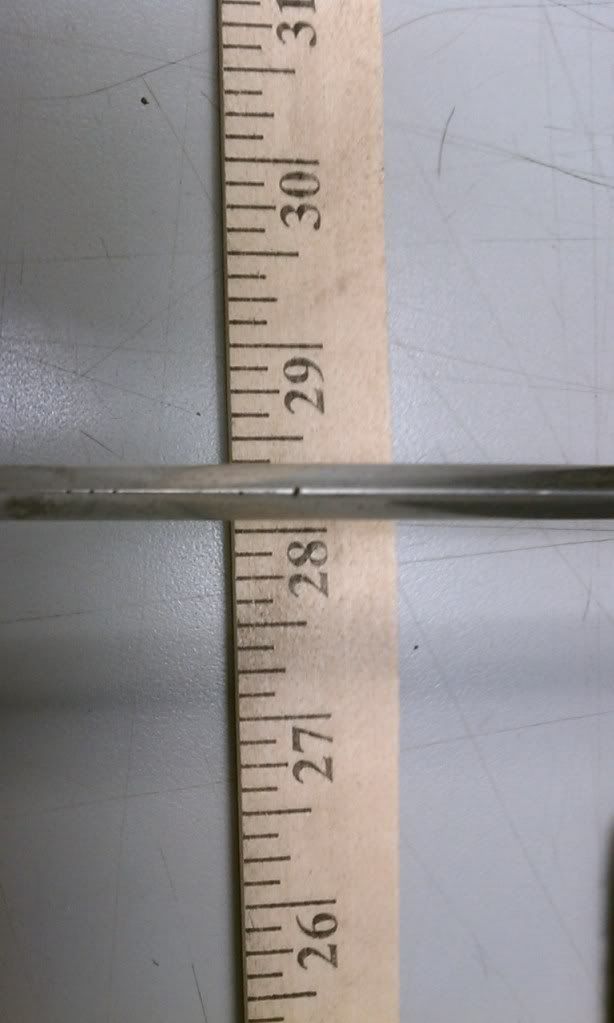 and finally, close ups of the crossguard and hilt: 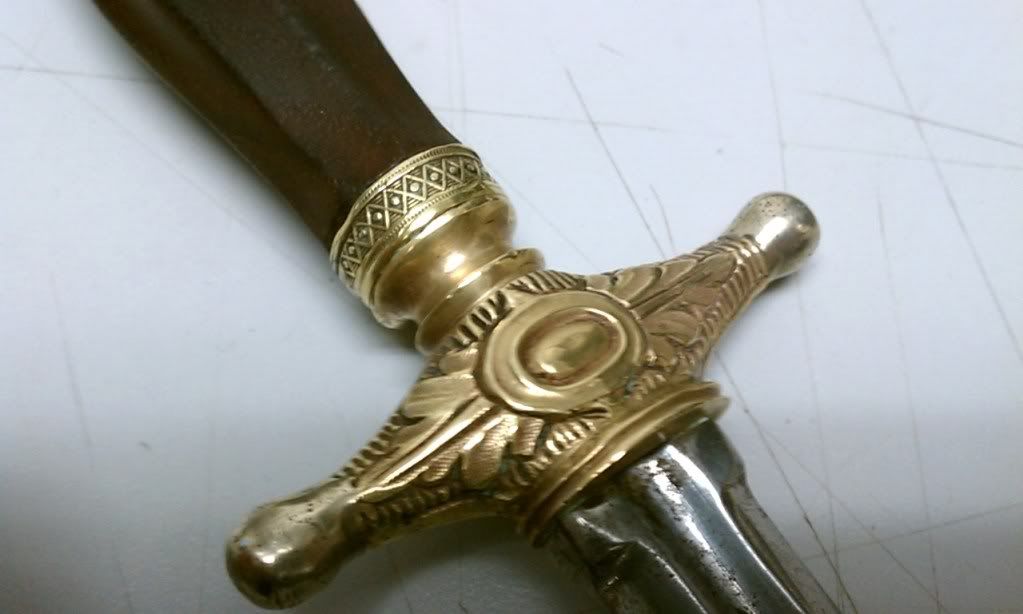 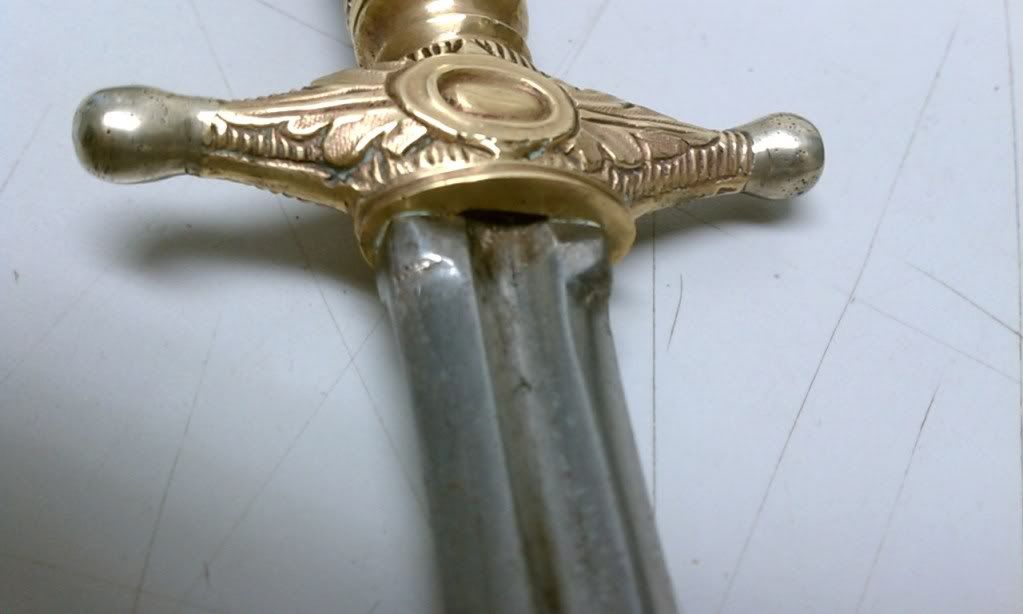 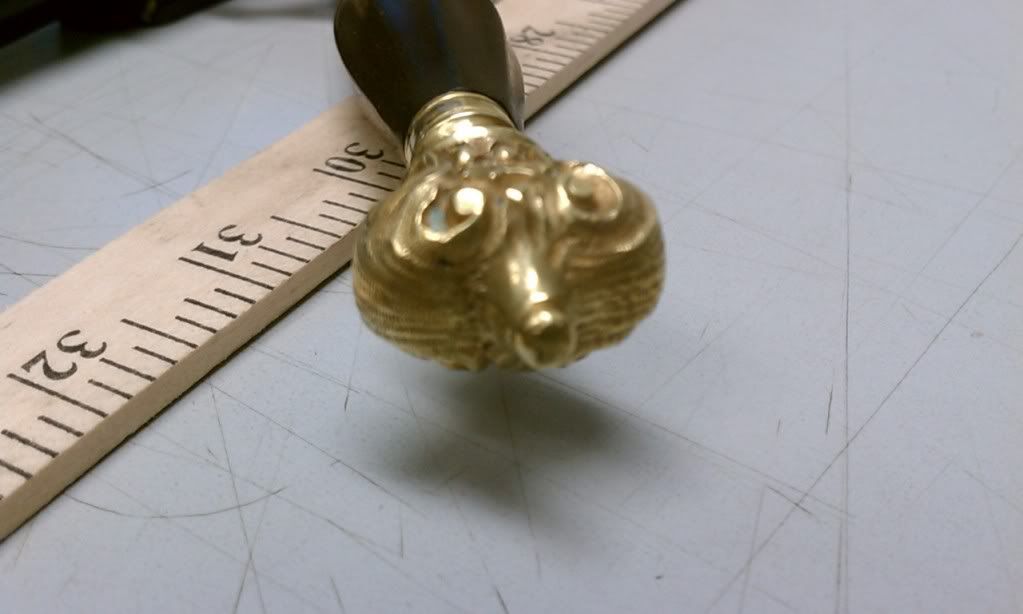
|
|
|

|
|
|
#18 |
|
Member
Join Date: Jun 2008
Location: The Sharp end
Posts: 2,928
|
Similar blade with short fuller:
   I would say that this is how your blade started. Visible fuller length beyond cup/guard on my sword is 10". I would place the date of the reconstruction to possibly end of the 18thC but more likey early 19thC (as Jim said). Despite the fact that this is made from a reclaimed blade, I think that it is of rather good quality. The mounts remind me of the Napoleonic era. There is an almost naval dirk look to the whole piece also. Rather interesting. Last edited by Atlantia; 28th March 2011 at 12:56 AM. |
|
|

|
|
|
#19 |
|
Member
Join Date: Dec 2004
Location: Witness Protection Program
Posts: 1,730
|
interesting indeed! what's the length of the sword?
|
|
|

|
|
|
#20 | |
|
Member
Join Date: Jun 2008
Location: The Sharp end
Posts: 2,928
|
Quote:
It is 41 1/2 " long overall with a 35" blade (visible edge). |
|
|
|

|
|
|
#21 |
|
Arms Historian
Join Date: Dec 2004
Location: Route 66
Posts: 10,782
|
Thanks very much Alan for the kind words
 Spunjer thanks too, and for adding the additional photos. The pictures Gene added give us exactly the image of how the blade would have looked, and this extremely nice rapier has the 'Sahagun' inscription often used on these Solingen blades. Note the characteristic symbols or sigils that are typically seen in these blades as well, which are added to imbue magical or talismanic properties and as quality guarantees. The exact character of these and attribution cannot with confidence be attributed to particular makers or periods, but certain consistancies seem to exist which are not yet fully documented. While we know of an early 17th century rapier for a boy with this name on the blade, we do not know exactly the style of the blade. Since this blade seems to correspond to what I believe are Solingen examples of latter 17th century, it seems quite possible this is a Solingen blade using the name. The possibility that it is in fact a 17th century blade to this maker also remains possible with more evidence supporting the existence of the maker in Italy. The symbol or sigil that looks like a cursive M may be either an astrological symbol (virgo, scorpio?) or a sigil of undetermined meaning which were often adopted by makers and applied along with these names. The hilt appears of course to represent the Royal crowns of the United Kingdom not only in its shape as a crown, but the cross pattee, or often considered Tuetonic cross as seen on these crowns....and.below it the shamrock. During and after the Napoleonic Wars the fluer de lis was removed from the Royal coat of arms and typically was present on the crowns. The harp of Ireland was added in the quarter on the arms, and perhaps the shamrock takes the place on the crown as here. For this reason, and the regal theme I think this is an assemblage from the early blade and cast mounts about mid to latter 19th c. Very nice dagger which has a nice dirk presence to it. All best regards, Jim |
|
|

|
|
|
#22 |
|
Member
Join Date: Dec 2004
Location: Witness Protection Program
Posts: 1,730
|
thank you for the additional photo, gene, and once again, thank you jim for your esteemed assessment! i'll pass this on to the owner, and i'm sure he'll be more than happy to find out his $125 dollar pick up from a flea market is more than just a "neat dagger".
  
|
|
|

|
|
|
#23 |
|
Member
Join Date: Jun 2008
Location: The Sharp end
Posts: 2,928
|
You're welcome Spunjer.
Has anyone noticed that the 'ball' ends of the quillions have been 'added on' and aren't original to the crossguard. Poses several interesting questions. The first of which is of course, is it a modified court/smallsword hilt?  (discuss) |
|
|

|
|
|
#24 |
|
Arms Historian
Join Date: Dec 2004
Location: Route 66
Posts: 10,782
|
You bet Spunjer!!! Tell your friend he 'done good!'
 Gene, very astute!!! and I had not noticed the terminals might be replaced, nor the distinct indication this could be a smallsword guard. That makes this even more interesting yet, and it seems a lot of work to go to in order to refurbish this piece. To me the suggestion is that it well might have been the components of a valued heirloom sword which was revamped into a most attractive stiletto. As the smallsword fell out of favor in the 19th century, there was still the attraction of the gentry to romanticized Italian influences, and there would seem to be a strong case for this type situation here. All the best, Jim |
|
|

|
|
|
#25 | |
|
Member
Join Date: Jun 2008
Location: The Sharp end
Posts: 2,928
|
Quote:
Looks like it was one of the later ones with no finger loops (or small ones). I did wonder if the rapier blade was remounted as a small sword, then got broken and was reincarnated a third time into the dagger? Possibly too far a stretch 
Last edited by Atlantia; 28th March 2011 at 08:48 PM. |
|
|
|

|
|
|
#26 |
|
Member
Join Date: Dec 2004
Location: Witness Protection Program
Posts: 1,730
|
another thing, he was wondering as well if the tips of the crossguard was modified. if you notice in the picture, it looks as if it was abbreviated somehow. perhaps to make it look balanced (as oppose to a longer one from its previous life)...
|
|
|

|
|
|
#27 | |
|
Member
Join Date: Jun 2008
Location: The Sharp end
Posts: 2,928
|
Quote:
Something along the lines of (but a slightly different style)  
Last edited by Atlantia; 28th March 2011 at 08:41 PM. |
|
|
|

|
|
|
#28 | |
|
Member
Join Date: Dec 2004
Location: Witness Protection Program
Posts: 1,730
|
Quote:
|
|
|
|

|
|
|
#29 | |
|
Member
Join Date: Jun 2008
Location: The Sharp end
Posts: 2,928
|
Quote:
LOl, no worries mate.  Strange to think that it just might have had 3 lives! |
|
|
|

|
 |
| Thread Tools | Search this Thread |
| Display Modes | |
|
|